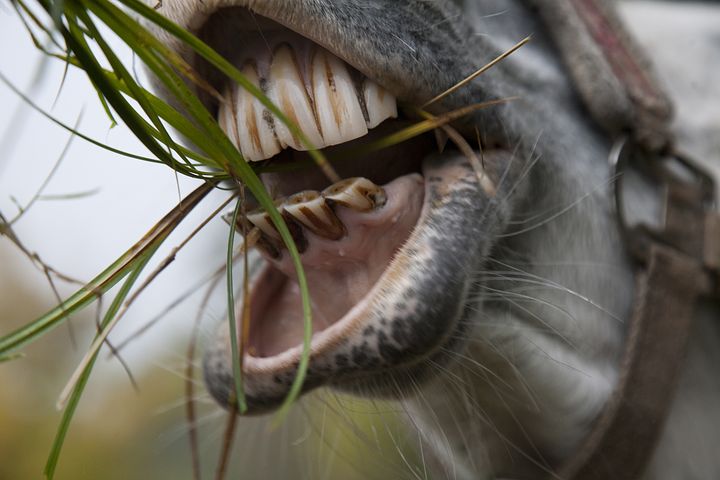Throughout its life, your horse’s teeth will grow and change, which is why you will need to ensure its teeth are regularly checked and cared for. Dental check-ups are essential for horses. Knowing what signs to look for will help prevent future dental problems.
You may not be aware that all horses should receive a complete dental exam at least once a year, starting from their first year of life. In this way, dental problems can be spotted early and dealt with effectively before they cause too many problems. However, knowing what problematic signs to look out for will help prevent future dental problems. This article aims to explain everything you need to know about caring for your horse’s teeth.
Horse Teeth
Regular dental care is essential for healthy teeth and gums, both for you and your horse but for now let’s focus on your horse. A horse’s mouth contains two main types of teeth: the incisors, otherwise known as cutting teeth, are at the front of the mouth while the molars, otherwise known as the grinding teeth, are situated at the back of the mouth. Both the incisors and the molars are just as important for normal food intake and proper digestion.
Signs and Symptoms
Just as you can run into dental problems throughout your life, your horse can too. However, unlike you, your horse can’t verbally express the discomfort he may be experiencing. Instead, he may indicate in other ways. Below are some of the most common signs that your horse is suffering from dental problems:
- Head tossing
- Bit chewing
- Tongue lolling
- Eating slowly
- Slobbering
- Head-tilting
- Weight loss
Dental problems can cause a myriad of problems. The key in spotting these telling signs is knowing your horse well and knowing what to look for so that you can take appropriate action.
Young Horses
Young horses require frequent dental inspections to ensure that their milk teeth shed successfully so that their adult teeth have room to come in. We would recommend booking a dental examination for your horse twice a year. When your horse sheds its milk teeth, they will simply fall out. Do not be alarmed to find a few teeth lying about. However, occasionally, a tooth will not dislodge itself the way it should and this can cause to discomfort and infection. Some indications that there may be a problem are:
- Your horse carrying its head to one side
- Bad smelling breath
- Drooling or foaming at the mouth
- Violent head tossing that is uncharacteristic of your horse
- Unusual chewing
- Spitting out pieces of grass and hay
If you notice any of these signs, we would recommend calling a dentist or veterinarian to come and inspect your horse’s mouth for the cause of the problem.
Adult Horses
Adult horses require less regular check-ups than young fouls, only needing a professional dentil inspection once a year, even when there seem to be no problems. Understandably, as your horse gets older more problems are likely to occur and dental visits may become more regular. Most commonly, horses form sharp edges and hooks on their teeth which can cut into parts of their mouth causing pain. This is a sign of their teeth wearing down and they will need to be filled back so that the edges of their teeth are softened, eradicating any discomfort or cutting of the inside of the mouth.
Senior Horses
Senior horses require more frequent dental inspections as they are more prone to suffering from tooth loss, damage, decay and infections. Loss of teeth in older horses is extremely common. However, it can make it difficult for your horse to chew properly. This is a good time to feed special, easy-chew food to your horse that is easier on his teeth. Make sure to keep a careful eye on how much your horse is eating and that he is getting his fair share of pasture time. Senior horses are harder to keep in good condition but all they need is a little bit of extra care. Your veterinarian is the best advisor for keeping your older horse happy and healthy.
Floating
Floating is the practice of filing off any sharp edges or hooks that may have formed on the edges of your horse’s teeth. It is one of the most common equine dental procedures and should be carried out at least once a year to ensure that your horse’s teeth are keep in good condition.
Conclusion
At Prime Stables, we are passionate about caring well for horses and helping others to do the same. Be sure to check out our online shop for the best grooming products for your horse. We hope you have found this article useful. If you have any questions, please do not hesitate to get in contact with us, we would love to hear from you!


